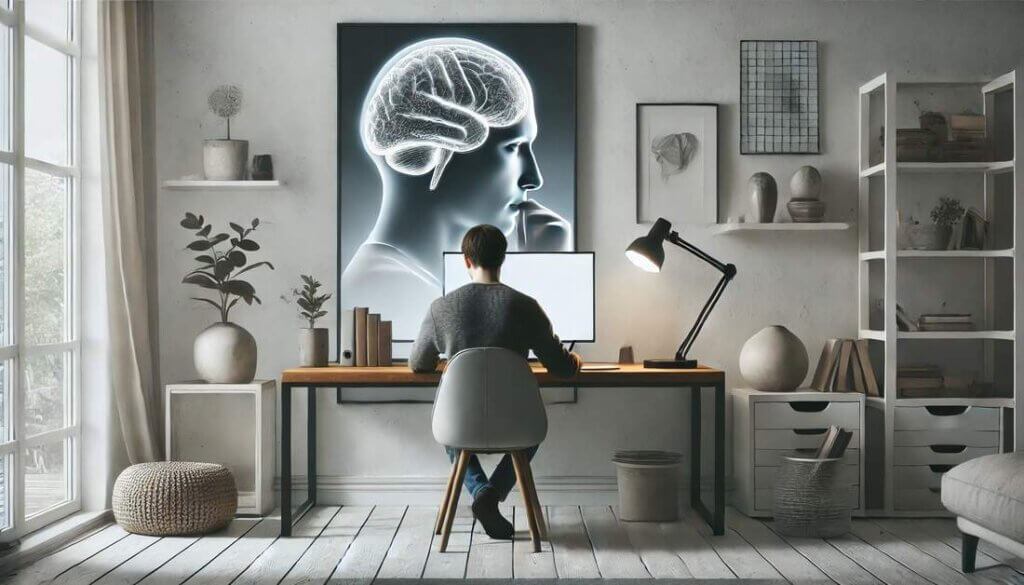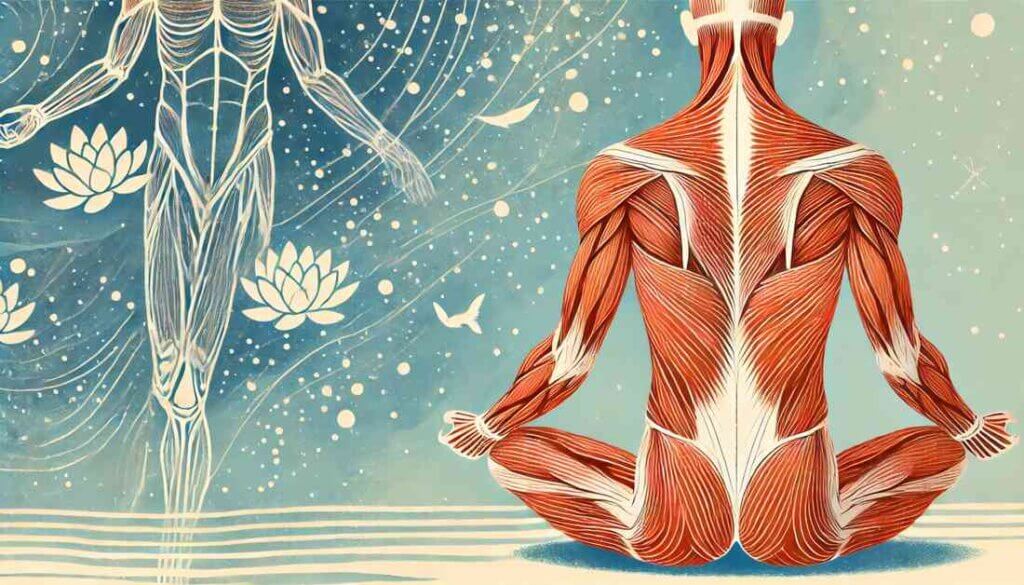Relationship between meditation and relaxation: In today’s busy world, finding ways to relax is essential for our mental and physical health. One effective way to achieve deep relaxation is through meditation. This post will explore the practical benefits of meditation and how they help us relax, highlighting the powerful connection between the two.
Connection between meditation and relaxation
| S.No | Necessary Elements for Relaxation | How Meditation Improves These Elements |
| 1 | Stress Management | Meditation lowers cortisol levels and activates the parasympathetic nervous system, reducing overall stress and promoting a calm state. |
| 2 | Quality Sleep | Meditation calms the mind and reduces mental chatter, helping individuals fall asleep faster and enhancing the depth and quality of sleep. |
| 3 | Emotional Stability | Meditation promotes mindfulness and acceptance, allowing individuals to manage anxiety and stress effectively, leading to emotional balance. |
| 4 | Physical Comfort | Meditation includes techniques like deep breathing and progressive muscle relaxation, which reduce muscle tension and lower blood pressure, enhancing physical relaxation. |
| 5 | Mental Clarity | Meditation enhances focus and mental clarity by training the mind to stay present, reducing feelings of overwhelm and promoting a relaxed mental state. |
| 6 | Spiritual Connection | Samarpan Meditation fosters a sense of spiritual connection and inner peace, helping individuals surrender their worries and achieve profound relaxation. |
| 7 | Reduced Muscle Tension | Progressive muscle relaxation and deep breathing in meditation help reduce physical tension and promote relaxation. |
| 8 | Lower Blood Pressure | Meditation has been shown to lower blood pressure by promoting relaxation and reducing stress, supporting cardiovascular health. |
| 9 | Improved Immune Function | Meditation can enhance your immune system, helping your body fend off illnesses and maintain overall health. |
| 10 | Enhanced Self-Awareness | Meditation encourages self-reflection and awareness, leading to better understanding and acceptance of oneself, contributing to relaxation. |
Stress Management

Meditation is a fantastic tool for managing stress, one of the biggest obstacles to relaxation. By practicing meditation, we can lower cortisol levels in our bodies, which is the hormone linked to stress.
High cortisol levels can lead to chronic stress, anxiety, and other health issues like high blood pressure and impaired cognitive function.
Meditation encourages us to focus on the present and observe our thoughts and feelings without judgment. This practice can break the cycle of negative thinking that often accompanies stress.
By staying in the moment, we can stop stress-inducing thoughts and allow our bodies and minds to relax.
Additionally, meditation activates the parasympathetic nervous system, known as the “rest and digest” system. This system counteracts the body’s “fight or flight” response, triggered by stress.
Activating this system lowers our heart rate and blood pressure, promoting physical and mental relaxation. [Relationship between meditation and relaxation]
Regular meditation practice can build resilience to stress and lessen its overall impact. Reducing stress levels is key to achieving relaxation because it allows our bodies to repair and restore themselves, leading to better health and well-being.
Meditation also creates a mental environment that fosters emotional resilience. When we manage stress effectively, we can focus on other activities with greater clarity and purpose.
This mental shift allows for more efficient problem-solving and decision-making, often hindered by stress.
Incorporating meditation into your daily routine can lead to lasting improvements in stress management.
Even dedicating a few minutes each day to this practice can significantly reduce your stress levels and enhance your quality of life.
Quality Sleep

Good sleep is crucial for relaxation and overall health, yet many people struggle with sleep disorders. Meditation can improve sleep quality by calming the mind and reducing the mental chatter that often interferes with sleep.
One way meditation helps is by enabling us to fall asleep faster. By focusing the mind and relaxing the body, meditation can transition us from the day’s stresses to a more peaceful state, making it easier to fall asleep. [Relationship between meditation and relaxation]
Meditation also enhances the depth and duration of sleep. Deep, restorative sleep is vital for our health, and meditation promotes this by calming the nervous system. This leads to lower heart rates and reduced muscle tension, conducive to restful sleep.
Scientific studies support meditation’s effectiveness in improving sleep. For instance, research published in “JAMA Internal Medicine” found that mindfulness meditation significantly improved sleep quality and reduced insomnia symptoms.
Meditation helps regulate the sleep-wake cycle by influencing melatonin production, the hormone responsible for sleep.
Studies show that meditation can increase melatonin levels, helping maintain a regular sleep pattern and improving overall sleep quality.
Creating a nightly meditation routine can establish a consistent and calming pre-sleep ritual. Over time, this practice can lead to better sleep quality, allowing you to wake up refreshed and relaxed.
Emotional Stability

Emotional stability is vital for relaxation, as unmanaged emotions can lead to stress and tension. Meditation enhances emotional regulation by promoting mindfulness, which involves observing thoughts and emotions without judgment.
This practice helps us develop greater awareness of our emotional states and respond more effectively. [Relationship between meditation and relaxation]
Mindfulness meditation encourages us to focus on the present and accept our thoughts and feelings as they arise. This acceptance reduces the tendency to react impulsively or negatively.
Instead, we learn to observe our emotions, understand their origins, and choose balanced responses.
Regular meditation practice leads to greater emotional stability. By consistently observing and accepting our emotions, we become better at managing stress and anxiety.
This emotional resilience is crucial for maintaining relaxation, as it helps us navigate life’s challenges without becoming overwhelmed.
Scientific evidence supports meditation’s benefits for emotional regulation. A study in “Frontiers in Psychology” found that mindfulness meditation reduced anxiety and depression symptoms and improved emotional regulation and overall well-being.
Meditation also impacts brain regions associated with emotion regulation. Neuroimaging studies show that meditation can increase gray matter density in the prefrontal cortex, responsible for decision-making and emotional control. This structural change enhances our ability to regulate emotions effectively.
Incorporating meditation into daily life helps develop a balanced and relaxed approach to emotions. Practicing mindfulness and emotional regulation reduces negative emotions’ impact and fosters inner peace and relaxation.
Emotional stability from meditation also enhances interpersonal relationships. When emotionally stable, we communicate more effectively and empathetically, strengthening our relationships and further contributing to relaxation. [Relationship between meditation and relaxation]
Physical Comfort

Physical comfort is a significant benefit of meditation that greatly contributes to overall well-being. Meditation techniques like progressive muscle relaxation and deep breathing help reduce physical tension and promote relaxation.
Progressive muscle relaxation involves tensing and then relaxing different muscle groups. This practice increases awareness of physical tension and teaches effective release methods. Including progressive muscle relaxation in meditation helps achieve deeper physical relaxation.
Deep breathing exercises, common in meditation, also play a crucial role in physical relaxation. Slow, deep breaths activate the parasympathetic nervous system, promoting relaxation.
Deep breathing reduces muscle tension, lowers blood pressure, and decreases heart rate, all contributing to a relaxed state.
Scientific research supports meditation’s effectiveness for physical relaxation. A study in “Psychosomatic Medicine” found that mindfulness meditation significantly reduced muscle tension and improved physical relaxation.
Moreover, meditation lowers blood pressure, a critical factor in physical relaxation. High blood pressure often results from chronic stress and can lead to health problems like heart disease. By promoting relaxation and reducing stress, meditation supports cardiovascular health.
Regularly practicing meditation techniques like progressive muscle relaxation and deep breathing can lead to sustained physical relaxation. This physical relaxation supports overall health and well-being, allowing for a more peaceful life.
[Relationship between meditation and relaxation]
Physical comfort from meditation also enhances the body’s ability to heal and recover. In a relaxed state, the body can repair tissues, reduce inflammation, and restore energy levels more effectively. This improved physical health contributes to overall well-being and relaxation.
Mental Clarity

Achieving mental clarity and focus is integral to relaxation. Meditation enhances these cognitive functions, contributing to a more relaxed mind.
Meditation practices train the mind to concentrate on the present moment and let go of distractions. This helps develop greater mental clarity, essential for relaxation.
By staying in the moment, we reduce feelings of overwhelm and mental clutter, allowing for a more relaxed mind.
Meditation enhances focus and clarity by increasing present-moment awareness. Observing thoughts and feelings without getting caught up in them keeps us grounded and prevents rumination on past events or future worries.
Scientific research supports meditation’s benefits for cognitive function. A study in “Psychological Science” found that mindfulness meditation improves working memory, attention, and cognitive flexibility.
Meditation also increases the prefrontal cortex’s thickness, responsible for decision-making, attention, and problem-solving. This structural change enhances focus and clarity.
[Relationship between meditation and relaxation]
Incorporating meditation into daily life can lead to sustained improvements in focus and clarity. Regularly practicing mindfulness and focused attention meditation develops mental clarity and reduces feelings of overwhelm. This clarity supports overall relaxation and well-being.
Mental clarity from meditation also enhances creativity and problem-solving abilities. A clear and focused mind generates new ideas and solutions, contributing to a sense of accomplishment and satisfaction, further promoting relaxation.
Spiritual Connection

A spiritual connection is a profound benefit of meditation that significantly enhances relaxation. Many meditation practices emphasize spiritual connection, fostering inner peace and tranquility.
Focusing on spiritual growth and connection to a higher power or universal consciousness leads to profound relaxation and fulfillment.
Meditation often involves practices like focusing on the breath, repeating a mantra, or visualizing a serene environment. These practices help us let go of worries and anxieties, allowing for deeper peace and contentment.
Surrendering to a higher power provides comforting support and guidance, incredibly relaxing.
Spiritual meditation practices include mantra repetition, visualization, and prayer, connecting us with spiritual beliefs and values. This connection provides a sense of purpose and meaning, essential for a relaxed mind. [Relationship between meditation and relaxation]
Research shows that spiritual practices positively impact mental and physical health. Regular spiritual practices like meditation reduce stress and anxiety and enhance well-being, contributing to relaxation and inner peace.
Incorporating spiritual meditation practices into daily life fosters a deeper sense of connection and fulfillment. This spiritual connection provides a solid foundation for relaxation, helping navigate life’s challenges with greater ease.
Spiritual connection from meditation also promotes a sense of belonging and community. Feeling connected to something greater than ourselves makes us feel more supported and less isolated, enhancing overall well-being and relaxation.
Reduced Muscle Tension

Reduced muscle tension is a direct benefit of meditation that significantly contributes to overall relaxation. Techniques like progressive muscle relaxation and deep breathing are particularly effective at reducing physical tension.
Progressive muscle relaxation involves systematically tensing and then relaxing different muscle groups, increasing awareness of physical tension and teaching effective release methods. Including this technique in meditation helps achieve deeper physical relaxation.
Deep breathing exercises, common in meditation, play a crucial role in reducing muscle tension. Slow, deep breaths activate the parasympathetic nervous system, promoting relaxation and reducing muscle tension. [Relationship between meditation and relaxation]
Scientific research supports meditation’s effectiveness in reducing muscle tension. A study in “Psychosomatic Medicine” found that mindfulness meditation significantly reduced muscle tension and improved physical relaxation.
Moreover, meditation lowers blood pressure, a critical factor in reducing muscle tension. High blood pressure often results from chronic stress and can lead to health problems. By promoting relaxation and reducing stress, meditation supports cardiovascular health.
Regularly practicing techniques like progressive muscle relaxation and deep breathing can lead to sustained reductions in muscle tension, supporting overall health and well-being.
Reduced muscle tension from meditation also enhances the body’s ability to heal and recover. In a relaxed state, the body can repair tissues, reduce inflammation, and restore energy levels more effectively. This improved physical health contributes to overall well-being and relaxation.
Lower Blood Pressure

Lowering blood pressure is a key benefit of meditation that contributes significantly to relaxation and overall health. High blood pressure, often linked to chronic stress, can lead to serious health problems. Meditation effectively reduces blood pressure by promoting relaxation and reducing stress.
When we experience stress, our body’s “fight or flight” response increases heart rate and blood pressure. [Relationship between meditation and relaxation]
Meditation counteracts this response by activating the parasympathetic nervous system, responsible for the “rest and digest” functions, lowering heart rate and blood pressure, creating physical calm and relaxation.
Mindfulness meditation significantly impacts blood pressure by reducing physiological stress responses.
Regular mindfulness meditation can lead to sustained reductions in blood pressure, promoting long-term cardiovascular health.
Other forms of meditation also benefit blood pressure by using techniques like deep breathing to promote relaxation. Reducing stress and anxiety helps lower blood pressure and supports overall well-being.
Incorporating meditation into daily life leads to lasting improvements in blood pressure management. Regular meditation practice develops a sense of calm and resilience to stress, maintaining healthy blood pressure levels.
Lower blood pressure contributes to physical relaxation and reduces the risk of serious health conditions, protecting cardiovascular health and promoting a peaceful life.
Improved Immune Function

Meditation can enhance your immune system, helping your body fend off illnesses and maintain overall health. A strong immune system is vital for relaxation, ensuring the body effectively fights infections and recovers from illness.
Research shows that meditation increases natural killer cell activity, crucial components of the immune system defending against viruses and cancer cells.
[Relationship between meditation and relaxation]
Meditation also reduces inflammation, a common factor in chronic diseases. Chronic inflammation weakens the immune system, increasing illness susceptibility. By reducing stress and promoting relaxation, meditation lowers inflammation and supports a healthy immune response.
Regular meditation practice increases antibody production, proteins that help the immune system neutralize harmful pathogens. This enhanced immune response maintains better overall health and well-being.
Incorporating meditation into a daily routine supports the immune system, improving the ability to fend off illness. This improved immune function contributes to relaxation, building confidence in the body’s ability to protect against harm.
Improved immune function from meditation enhances the body’s ability to heal and recover. A strong immune system allows the body to repair tissues, reduce inflammation, and restore energy levels effectively. This improved physical health contributes to overall well-being and relaxation.
Enhanced Self-Awareness

Self-awareness is crucial for relaxation, helping individuals understand and address stress and tension sources. Meditation encourages self-reflection and awareness, leading to better understanding and acceptance of oneself.
Through meditation, individuals become more attuned to their thoughts, emotions, and physical sensations, identifying stress sources and developing strategies to address them.
Regular meditation practice cultivates greater self-awareness and acceptance, improving relaxation and overall well-being. [Relationship between meditation and relaxation]
Meditation techniques like mindfulness promote self-awareness by encouraging observation of thoughts and feelings without judgment, recognizing patterns in thinking and behavior for more conscious choices.
Meditation also helps individuals understand their values and goals, aligning actions with values for greater fulfillment and inner peace.
Enhanced self-awareness promotes emotional intelligence, understanding and managing one’s emotions and others. Greater empathy and improved relationships contribute to a more relaxed life.
Self-awareness from meditation enhances personal growth. Awareness of strengths and weaknesses allows for self-improvement and achieving goals, contributing to satisfaction and well-being, promoting relaxation.
Samarpan Meditation

Samarpan Meditation emphasizes surrender and devotion, fostering deep inner peace and relaxation. Rooted in spiritual surrender, it involves letting go of the ego and connecting with higher consciousness.
Practicing Samarpan Meditation typically involves sitting comfortably, closing eyes, and focusing on surrendering to a higher power. This act releases worries and anxieties, leading to profound relaxation and inner peace.
Samarpan Meditation fosters spiritual connection and contentment. Surrendering the ego and embracing devotion provides deeper fulfillment and tranquility, offering a unique pathway to relaxation.
Samarpan Meditation enhances emotional regulation by promoting surrender and acceptance. Letting go of negative emotions encourages a positive mindset, effectively managing stress and anxiety. [Relationship between meditation and relaxation]
Incorporating Samarpan Meditation into daily life can lead to sustained relaxation and well-being improvements. Practicing surrender and devotion fosters inner peace, allowing for easier navigation of life’s challenges.
Although there are many meditation methods prevalent in society, I do not know much about them nor do I have any experience with them. Therefore, I cannot suggest you about them nor can I give you more information about them.
But if you are interested, you can get information about them and also try them. Later you can share your experience with me.
I have been practicing Samarpan Meditation for the last 15 years. This meditation has helped me a lot in finding relaxation in my life.
Conclusion [Relationship between meditation and relaxation]
Friends, I hope you liked this blog post of mine. If you liked this blog of mine, then I request you to please read my other blog posts as well. In this, I have discussed various topics of meditation, from which you can get appropriate information.
Secondly, if you have any questions related to this blog post, please ask me in the comment box. I will definitely try to answer your questions.
Finally, I would just like to tell you that meditation provides many practical benefits that directly contribute to relaxation. But for this it is very important for you to do regular meditation.
Although there are many such measures in society, which claim that they will give you relaxation, meditation is a very easy and simple solution which you can easily assimilate in your life and which will make you feel relaxed.
One such easy and simple meditation method is ‘Samarpan Meditation’. Meditation is a powerful tool to achieve deep relaxation. Incorporate it into your daily routine and experience the transformative effects it has on relaxation and overall well-being. Thank you.
To read my other blogs:- Click here
[Relationship between meditation and relaxation]